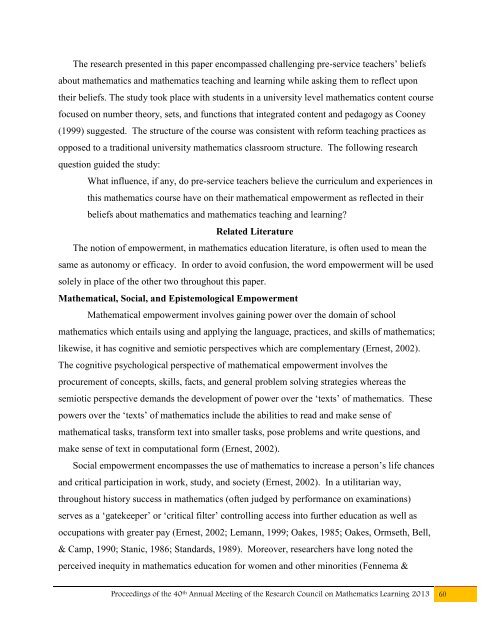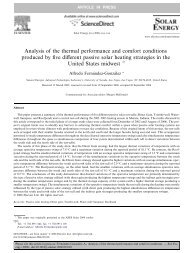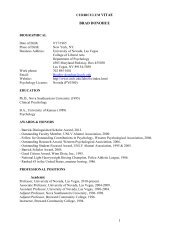2013 Conference Proceedings - University of Nevada, Las Vegas
2013 Conference Proceedings - University of Nevada, Las Vegas
2013 Conference Proceedings - University of Nevada, Las Vegas
- No tags were found...
Create successful ePaper yourself
Turn your PDF publications into a flip-book with our unique Google optimized e-Paper software.
The research presented in this paper encompassed challenging pre-service teachers’ beliefsabout mathematics and mathematics teaching and learning while asking them to reflect upontheir beliefs. The study took place with students in a university level mathematics content coursefocused on number theory, sets, and functions that integrated content and pedagogy as Cooney(1999) suggested. The structure <strong>of</strong> the course was consistent with reform teaching practices asopposed to a traditional university mathematics classroom structure. The following researchquestion guided the study:What influence, if any, do pre-service teachers believe the curriculum and experiences inthis mathematics course have on their mathematical empowerment as reflected in theirbeliefs about mathematics and mathematics teaching and learning?Related LiteratureThe notion <strong>of</strong> empowerment, in mathematics education literature, is <strong>of</strong>ten used to mean thesame as autonomy or efficacy. In order to avoid confusion, the word empowerment will be usedsolely in place <strong>of</strong> the other two throughout this paper.Mathematical, Social, and Epistemological EmpowermentMathematical empowerment involves gaining power over the domain <strong>of</strong> schoolmathematics which entails using and applying the language, practices, and skills <strong>of</strong> mathematics;likewise, it has cognitive and semiotic perspectives which are complementary (Ernest, 2002).The cognitive psychological perspective <strong>of</strong> mathematical empowerment involves theprocurement <strong>of</strong> concepts, skills, facts, and general problem solving strategies whereas thesemiotic perspective demands the development <strong>of</strong> power over the ‘texts’ <strong>of</strong> mathematics. Thesepowers over the ‘texts’ <strong>of</strong> mathematics include the abilities to read and make sense <strong>of</strong>mathematical tasks, transform text into smaller tasks, pose problems and write questions, andmake sense <strong>of</strong> text in computational form (Ernest, 2002).Social empowerment encompasses the use <strong>of</strong> mathematics to increase a person’s life chancesand critical participation in work, study, and society (Ernest, 2002). In a utilitarian way,throughout history success in mathematics (<strong>of</strong>ten judged by performance on examinations)serves as a ‘gatekeeper’ or ‘critical filter’ controlling access into further education as well asoccupations with greater pay (Ernest, 2002; Lemann, 1999; Oakes, 1985; Oakes, Ormseth, Bell,& Camp, 1990; Stanic, 1986; Standards, 1989). Moreover, researchers have long noted theperceived inequity in mathematics education for women and other minorities (Fennema &<strong>Proceedings</strong> <strong>of</strong> the 40 th Annual Meeting <strong>of</strong> the Research Council on Mathematics Learning <strong>2013</strong> 60




